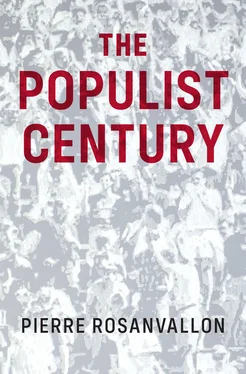History, Theory, Critique
Pierre Rosanvallon
Translated by Catherine Porter
polity
Originally published in French as Le siècle du populisme: Histoire, théorie, critique
© Editions du Seuil, 2020
This English edition © Polity Press, 2021
Polity Press
65 Bridge Street
Cambridge CB2 1UR, UK
Polity Press
101 Station Landing
Suite 300
Medford, MA 02155, USA
All rights reserved. Except for the quotation of short passages for the purpose of criticism and review, no part of this publication may be reproduced, stored in a retrieval system or transmitted, in any form or by any means, electronic, mechanical, photocopying, recording or otherwise, without the prior permission of the publisher.
ISBN-13: 978-1-5095-4628-2
ISBN-13: 978-1-5095-4629-9 (paperback)
A catalogue record for this book is available from the British Library.
Library of Congress Control Number: 2021938630
by Fakenham Prepress Solutions, Fakenham, Norfolk NR21 8NL
The publisher has used its best endeavours to ensure that the URLs for external websites referred to in this book are correct and active at the time of going to press. However, the publisher has no responsibility for the websites and can make no guarantee that a site will remain live or that the content is or will remain appropriate.
Every effort has been made to trace all copyright holders, but if any have been overlooked the publisher will be pleased to include any necessary credits in any subsequent reprint or edition.
For further information on Polity, visit our website: politybooks.com
INTRODUCTION: CONCEPTUALIZING POPULISM
Populism is revolutionizing twenty-first-century politics. But the disruption it brings has not yet been assessed with any degree of accuracy. The word may turn up everywhere, but no theory of the phenomenon has emerged. The term combines a look of intuitive self-evidence with a fuzzy form, as attested first and foremost by the semantic slipperiness manifested in its usage. For it is a decidedly malleable word, so erratic are its uses. The term is paradoxical, too: even though it is derived from the positive foundations of democratic life, it most often has a pejorative connotation. It is also a screen word, for it applies a single label to a whole set of contemporary political mutations whose complexity and deepest wellsprings need to be grasped. Is it appropriate, for instance, to use the same term to characterize Chávez’s Venezuela, Orbán’s Hungary, and Duterte’s Philippines, not to mention a figure like Trump? Does it make sense to put the Spaniards of Podemos and the followers of Jean-Luc Mélenchon’s movement, La France Insoumise (France Unbowed), in the same basket with the fervent supporters of Marine Le Pen, Matteo Salvini, or Nigel Farage? To understand something requires making distinctions; it is essential to resist simplifying amalgamations. Populism is a dubious notion, finally, because it often serves only to stigmatize adversaries, or to legitimize old claims by the powerful and the educated that they are superior to the “lower” classes, which are always deemed likely to mutate into plebeians governed by sinister passions. We cannot address the question of populism without keeping this observation in mind, as a caveat as well as a call for political lucidity and intellectual rigor in approaching the subject.
This necessary attention to the pitfalls that underlie the term “populism” must not lead us to stop using it, however, for two reasons. First, because in its very confusion it has proved unavoidable. If it has stuck to everyone’s lips and remains on everyone’s pen, despite all the reservations just mentioned, it is also because the term has responded, imprecisely but insistently, to a felt need to use new language to characterize an unprecedented dimension of the political cycle that has opened up at the turn of the twenty-first century – and because no competing term has surfaced so far. The newly launched political cycle is described by some as a pressing social expectation that the democratic project will be revitalized as the path of a more active sovereignty on the part of the people is rediscovered; others see it, conversely, as bearing signs that announce a threatening destabilization of that same project of revitalization. But the second decisive fact is that the term has been adopted with pride by political leaders seeking to pillory those who use it for the purpose of denunciation. 1We could make a long list of figures on the right and the far right who have sought to overturn the stigma, first by saying that the word didn’t scare them, and then by espousing it, over time. There has been a parallel evolution on the left, as attested in France in exemplary fashion by Jean-Luc Mélenchon: “I have no desire at all to defend myself against the accusation of populism,” he said as early as 2010. “It’s the elites expressing their disgust. Out with them all! Me, a populist? Bring it on!” 2The fact that a certain number of intellectuals have become advocates of a “left populism” has also helped considerably to give the term a desirable consistency and to make it common currency as a political designation. The positions and writings of Wendy Brown, Nancy Fraser, Ernesto Laclau, and Chantal Mouffe have weighed heavily in this direction, encouraging the retention of the word and validating the appropriateness of its use.
A reality to be theorized
The problem is that books devoted to populism, in their ever-increasing numbers, remain essentially focused on understanding the underpinnings of the populist vote in order to explain its spectacular advances throughout the world. Using the tools of electoral sociology and political science, these works characterize the populations involved, describing the values that motivate them, the way they relate to political life and institutions, and of course their living and working conditions, in various dimensions. Such investigations depict a social and cultural world that presents objective features common to many countries: people living on the margins of large cities in zones affected by industrial decline who can be defined as among the “losers” in globalization, people with below-average incomes and little if any higher education. And these people are angry, as well: they are defined, more subjectively, by their resentment toward a system in which they see themselves as held in contempt and reduced to invisibility; they fear being robbed of their identities as their locales open up to the world and to immigration. By bringing together multiple data sets and proposing new ways of looking at the issue, some of the existing studies have offered a better understanding of the makeup of populist electorates. At the same time, however, they have effectively forestalled an overall grasp of the phenomenon. They tacitly suggest that populism is a mere symptom, an indicator pointing to other things that by implication should be the real focus of our attention: the decline of the “party” form, for example, or the gulf that has deepened between the political class and society at large, or the suppression of the gap between a right and a left equally incapable of facing up to the urgencies of the present. In these cases, what is being conceptualized is not the nature of populism but rather its causes. Works of this sort all end up proposing yet another analysis of political disenchantment and contemporary social fractures.
The frequent reduction of populisms to their status as protest movements, with a focus on the political style and type of discourse associated with such movements, is another way of failing to take their full measure. 3If the dimension of protest is undeniable, it must nevertheless not be allowed to mask the fact that protest movements also constitute actual political statements that have their own coherence and positive force. The routine references in such movements to political figures of the past, in particular to far-right traditions, lead here again to reductionist characterizations. While populisms often do arise from within such traditions, the phenomenon has now taken on an additional dimension (even apart from the development of a populism that purports to be on the left).
Читать дальше












